 Vampire Weekend's Surprising Jewish Stories
Vampire Weekend's Surprising Jewish Stories
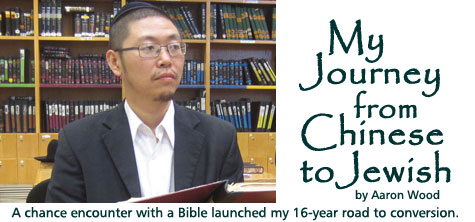

12 min read
A chance encounter with a Bible launched my 16-year road to conversion.
I was born and raised in Tianjin, China, a city southeast of Beijing with 13 million people. My father was an engineer and my mother was a technician.
Under Communist rule, I received a very secular education. The very idea of religion seemed nonexistent. Although traditionally China is not an atheistic country – there are hundreds of millions of Buddhists, Taoists and Confucians – the more recent influence of Communism, nationalism, and even Western consumerism has produced a strong atheist component.
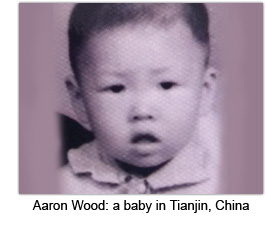
I attended university and studied mechanical engineering. In my senior year, after submitting my thesis, I had a lot of free time. So I began attending graduate-level English classes, taught by an American teacher.
One day after class, the teacher began speaking with me about religion and the Bible – a topic with which I was completely unfamiliar.
He gave me an English-Chinese Bible to read. I was eager to learn English, and the book seemed liked an excellent learning tool: English and Chinese sentences side-by-side, with each sentence numbered, making it easy to find the corresponding words.
I started to read the book carefully, word by word. This raised many questions – not only the definitions of certain English words, but also the concepts discussed in the book.
I went back to the teacher, again and again with my questions. I didn’t realize that he was a Christian missionary who had come to China on the pretense of teaching English… with the hidden agenda of proselytizing.
With my many questions, he did not waste the opportunity to indoctrinate me with Christian philosophy.
This process came to a sudden halt when his true identity was unmasked by the Chinese government. Though China generally has tolerance for religious activity, the government is suspicious of foreigners who may also possess subversive political goals – so he was not welcome to stay in China any longer.
I decided to seek out local Christian churches to continue my studies and began to attend church every Sunday. The Chinese pastors were not able to read the Bible in English (not to mention the original Hebrew), yet they impressed upon me Christian ideas such as: the Jews are guilty of deicide; Jews invented tradition to replace the holy revelation; Jews are blind and unable to see the light of truth, etc.
I had never met a Jew, nor knew anything of their history. All my information came from the Chinese media which depicts Jews as evil thieves and Israel as aggressive imperialists and an American proxy. So I did not question the validity of these negative Christian teachings about Jews.
Years in the Library
 After graduation I got a good job working as an engineer in automotive design.
After graduation I got a good job working as an engineer in automotive design.
I spent most of my free time undertaking a more thorough study of religion. I obtained various versions of the Bible, both in Chinese and English, and read all of them very carefully, word by word. This was not an easy task. I spent years studying the Bible, along with any books I could find about Western religions.
I encountered various discrepancies in the translations. For example, the "virgin birth" is of fundamental importance to Christianity, yet in some Bibles the Hebrew word almah (Isaiah 7:14) is translated not as "virgin" but as "young woman."
I tried to find a pastor who could help resolve this contradiction, but unfortunately, even in a country of a billion-plus people, I could not locate anyone with sufficient scholarship in the text.
I realized that if I truly wanted to understand the authentic meaning of the Bible, my only choice was to learn Hebrew myself.
I set my sights on the huge central library, whose foreign language section took up almost an entire building. This was before the Internet and the book catalogue was not computerized. The religion section was particularly poorly done and I had to pore through each book by hand. The good news is there were two librarians and I was the only customer.
After two years the library finally acquired a Hebrew-English dictionary.
It was a slow, steady process to becoming proficient in Hebrew. After about two years the library acquired a Hebrew-English dictionary which helped me learn the alphabet. Unfortunately I still didn’t know how to pronounce anything, because while a dictionary helps for reading, you can only guess at the sounds.
Another couple of years later, with Israel and China normalizing diplomatic relations, a Chinese tourist went to visit and brought back a “learn Hebrew” CD. That eventually got passed along to me and I crossed another hurdle in my quest, finally hearing spoken Hebrew for the first time.
After that I met a nice man, Avigdor Cohen from Maaleh Adumin in Israel, on a Bible-related Internet forum. We began corresponding by email and he sent me a Hebrew-English Bible. For those who have always had access to Judaism, it’s probably hard to appreciate how thrilling it was for me to finally have the authentic original text in my hand.
At the time I was teaching Chinese to foreign visitors, and one of my students gave me a Hebrew-only Bible. I brought it to church and showed it to the pastor in order to gauge his reaction. There was no reaction, however, because he had no idea that it was Hebrew he was looking at. At this point I was becoming more and more reluctant to rely on anyone claiming to be a “faithful believer in God’s Word” who could not even recognize the Words.
Again I became more independent in my search. I set out to read any book I could find that was even remotely connected to the Jews – everything from Holocaust memoirs to Israeli politics. Around this time the Internet was coming into full swing. The Chinese government had not yet instituted filtering technology, so I had full access to everything from Maimonides to Martin Buber. All this made a tremendous intellectual impact on me.
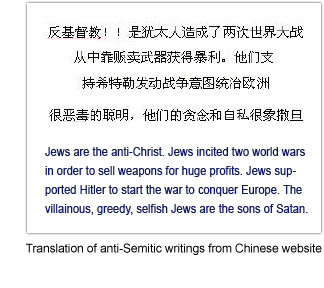 The more I read about the Jews, the clearer I saw how Christianity had taken Judaism and twisted it into something else. I assumed it was all a series of unintentional misunderstandings, so I began writing articles in Chinese about the Jews and publishing them on the Internet with the hope of dissipating Christian misunderstanding.
The more I read about the Jews, the clearer I saw how Christianity had taken Judaism and twisted it into something else. I assumed it was all a series of unintentional misunderstandings, so I began writing articles in Chinese about the Jews and publishing them on the Internet with the hope of dissipating Christian misunderstanding.
Before long, I received vehement threats from Chinese fundamentalist Christians. This awakened me to the persistent reality of anti-Semitism.
This attitude really bothered me because it raised a contradiction between what I read in the Jewish books of a nation subscribing to mankind's loftiest ideals – universal education, care for the sick and the poor, justice for all – with the evil image of Jews that pervades the Chinese media.
I started to think about what being Jewish might mean for me and decided to try locating a Jew in China. You might think this was easy. After all, in the first half of the 20th century, thousands of European Jewish refugees arrived in China, and there has been a steady influx of Jews concurrent with the economic expansion of Hong Kong, Shanghai and Beijing.
Finally I got in touch with a man named David Buxbaum, an American Jewish lawyer practicing in East Asia. (Coincidentally, his son Benyamin Buxbaum is the email list manager at Aish.com.) We met in David’s office in Beijing, in the same building that houses the Israeli Embassy. It was a real breakthrough to talk with a flesh-and-blood Jew who believes in the veracity of the Jewish Bible.
Yet what really impressed me was how humble, sincere and scholarly this man was. Now I knew that the negative stereotypes I had been getting from the Chinese media were indefensible.
Coming Home
Throughout this process, I kept coming back to a memory I had from years earlier as a teenager.
I had been listening to my shortwave radio and although I could not understand what the people were saying, it sounded like they were reading Scripture. The only words I understood was a phrase that was repeated several times: “Return to Israel.” I didn’t pick up the context of their discussion, and at the time I didn’t even know what Israel was. Yet I somehow felt a deep emotional connection every time I heard “Return to Israel,” time and again.
During my years of research, this refrain kept ringing in my head. I identified very clearly with the Jews, wandering the world in search of the promised land. I felt that I, too, was wandering in search of my homeland.
After a long build-up I finally reached a point of utter clarity. I decided to become Jewish and move to Israel… although I had no clue of what precisely that would entail.
I needed a halfway stop to become Jewish and then go to Israel.
I soon discovered it was logistically impossible to achieve this from the confines of China. I needed a halfway stop to serve as a launching point – enabling me to gain Western citizenship, become Jewish, and then go to Israel.
There was no direct path and I needed a plan.
I had a friend living in Canada, a Chinese guy who had successfully navigated the immigration process. He showed me exactly how to do it. So in 2005 I moved to Toronto and that became part of my destiny.
I got a job in mechanical engineering. I began attending the Village Shul, which is part of the Aish network. I saw Judaism alive and in action. Imagine my first taste of matzah, my first shofar blast, my first dance at a Jewish wedding. It was all so beautiful, so pure, so untainted by the cynicism and materialism that has overrun our lives.
As I learned more and more, it felt hypocritical that I was not putting this into practice. So I made a decision to become observant: Lighting Shabbat candles. Prayer. Kosher. The big deal was when I stopped eating pork products, which is a main ingredient in almost all Chinese food.
I studied, I struggled, and I questioned. I was determined to take this as far as the truth would allow.
A few years past and I was starting to feel like a Jew. I identified with the Jewish people who have been so unjustly slandered and persecuted. I understood that Judaism is true, and in order to solidify my love for the truth, I was ready to become Jewish.
I studied extensively with Rabbi Robinson in Toronto, who guided me carefully through the whole process. In 2011, after 16 long years of journey, I completed my conversion with Rabbi Shlomo Miller in Toronto. I had finally come home to the Jewish people.
Some converts describe the conversion process as “gaining a new identity.” I did not feel that way, however. For me, it was more like the actualization of a longtime identity that I yearned to fulfill.
Not in a Vacuum
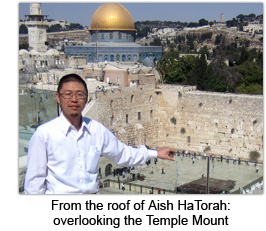
Since the conversion I have continued my passion of studying Torah, and in May 2012 I arrived at the Aish Yeshiva in Jerusalem. For me this opportunity was like winning the lottery. Who would have thought that a kid growing up in Tianjin would one day be studying Torah at the best location in the world – directly across from the Western Wall.
My goals are to study Torah, settle in the land of Israel, and fight anti-Semitism. As I have become more aware of modern anti-Semitism in the form of demonizing Israel, I began a Chinese blog to provide basic knowledge of Jews and Israel so Chinese people will not become easily brainwashed by the overwhelming media bias.
I am also working to translate counter-missionary materials into Chinese, in order to refute religious slander against the Jews.
I am disappointed that the modern State of Israel has less Jewishness than I expected. For me this was a culture shock. Ironically, I discovered there are around 20,000 Chinese workers in Israel, mostly involved in menial labor.
This whole thing has not been easy with my family. My parents don’t like religion and they have a very closed mind about this. I have a younger sister who is more understanding; she studied in D.C. and is now living in Shanghai.
Looking back, I see that my Jewish identity did not totally arise in a vacuum. The history of Jews in China actually dates back many centuries. Some people even suggest that China harbors some remnants of the Lost Ten Tribes.
It is believed that Jews first immigrated to China, through Persia, following the Roman Emperor Titus's capture of Jerusalem in 70 CE. Jews lived in China throughout the Middle Ages and till today some Chinese communities practice rituals that resemble Judaism. For many centuries (1163-1860) there was a Jewish community in Kaifeng, 650 miles from Beijing. They did not eat pork, they placed some form of mezuzah on their doorposts, and they spoke of a faraway homeland called Israel. (Recently, 14 people from Kaifeng made aliyah and converted.)
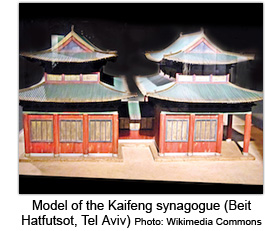 In the early 20th century, Russian Jews fleeing pogroms moved northeast to China, as did Jews escaping the 1917 Russian Revolution via the Trans-Siberian Railway. Only much later did I discover that my own city of Tianjin actually has a non-functioning synagogue, built in the early 1900s by Russian refugees.
In the early 20th century, Russian Jews fleeing pogroms moved northeast to China, as did Jews escaping the 1917 Russian Revolution via the Trans-Siberian Railway. Only much later did I discover that my own city of Tianjin actually has a non-functioning synagogue, built in the early 1900s by Russian refugees.
Ironically, today there is a growing Chinese fascination with Judaism. Three universities have departments of Jewish studies, with probably a few hundred master’s and doctoral candidates, all of whom are Chinese. In operating on a purely academic level, however, these studies tend to miss out on the spiritual core driving the Jewish people. The Talmud in particular has gained a reputation as the “grand repository of secret business advice.” With popular Chinese titles like Crack the Talmud: 101 Jewish Business Rules, this faux-Talmudic wisdom has now become a guide for those seeking fortunes.
As for myself, I am grateful to have discovered that the real “wealth” of Judaism is in its ethics and spirituality.
My Chinese family name is Chai, which translates as “wood.” It’s amazing that this same word is the iconic Hebrew word for “life.” I chose a new Jewish first name, Aaron, because the biblical Aaron was known as a man of truth and a lover of peace. The Jewish people are lovers of truth and peace. That’s why I joined.
